Surprising Expats: Victoria Azarov, 4th Year Medical Student at Semmelweis University, Budapest
- 1 Aug 2024 2:58 PM

If you would like to be interviewed as a Surprising Expat, please write with a few details of what you do, to: Marion by clicking here.
On hearing Victoria Azarov’s story one might remark: To embark on a six-year medical degree with one child, could be regarded as ambitious; to do so with four, might be considered foolhardy. But this is exactly what USSR-born Victoria did.
What is more, she initially planned to gain acceptance to the Hungarian language medical course at Semmelweis University, though she had at that time been in Hungary for only eight years and did not know one word of the language before she came to live in Budapest.
The labyrinthine route from Victoria’s early years in Mityiscsi, close to Moscow, to her present life in Budapest’s 16th district, is the stuff of fiction.
“I was born in the USSR, a couple of months before it fell apart. My dad was killed by a car when I was just four months old, so I never knew him, and I was raised by my mum. My mother was a maths teacher at a private school, and there she met the British gentleman who later became my stepdad – he had come to work as an English teacher there.
“I was about seven years old when my stepdad came to Russia and my parents met, and then, when I was eleven, we moved to China because my stepdad got a job there as an English teacher. They thought it was going to be only a one-year adventure, and then it turned into eight years of constantly moving between different cities in China and Vietnam, and then back to China.”
 Nursery in Russia; Victoria – back row, 2nd from the right
Nursery in Russia; Victoria – back row, 2nd from the right
Victoria and her mother had always spoken Russian to one another, and although Victoria had learnt some basics of English at school, she was still a beginner.
“At first my mum decided she was going to homeschool me. But then, after a couple of months, she’d had enough of it, and I was sent to a Chinese school – just to a local one. You know, it's a sort of sink or swim situation: either you die, or you don't, and you have to adapt. So that's what I did. I had to learn Chinese.
“Meanwhile I was quickly coming to grips with English as well - not only did it become our family language, but it was also the language of the multicultural community of English teachers at my parents’ workplace where I spent a lot of my time after school. Being an only child and a foreigner in a place with very few expats, let alone expat kids, meant there weren’t any people my age to make friends with during those years. So, I was either at work with my parents, or reading a lot at home in all the languages I could, immersing myself in American TV shows of the time. I think to this day I know a lot of ‘Friends’ episodes by heart!”
Victoria spent two years in the Chinese school in Dalian followed by a further year in Shanghai. When the family then moved to Vietnam, she joined the Russian embassy school, and when they once again returned to China, she was able to complete her education ahead of schedule, at the age of sixteen. She then studied for international A-levels as a private student.
Alongside her studies she was volunteering as an English teacher at a school for migrant children in Shanghai and completing an internship at the headquarters of the English language-teaching company where her parents worked.
“I will never forget the feeling of walking into a fifty-student classroom of ten-year-olds on the outskirts of the city as a very young and new teacher, not much older than the students whose attention I was supposed to capture. It was a nerve-wrecking and character-building experience.”
She had, since being a child, nurtured an ambition to become a doctor, however, she soon realised that the fees for such a course were well out of her parents’ reach. This was also the point when she learnt of her family moving to Moscow for her father’s work.
“I did some exams and I managed to get into a linguistics and law programme there and worked at an English-teaching school on the side,” says Victoria. “I still wanted to do medicine. But you know, it was what it was. And then it so happened that I met my future husband….”
Andrew, born into a multicultural family in Moscow, was already living in Budapest, his family having made the move some years earlier; he was twenty-two and Victoria was just eithteen years old. Andrew’s mother and he were making a visit to Russia to sort out inheritance matters following the recent death of his father.
Coincidentally, Andrew’s mother used to own and run the school where both Victoria’s parents had initially taught ten years previously. In fact, it was she who had introduced Victoria’s parents to each other, and they had all kept in touch and remained friends for years!
During this 2009 visit, Andrew’s widowed mother and Victoria’s parents arranged a friendly dinner between the two families, where the young people met. It was love at first sight!
“We dated from that first week he was there, and then he would come to visit me. We had a long-distance relationship from that moment on. I came to Budapest once or twice as well. The first time I visited it was wintertime and everything was covered in snow. Imagine my surprise taking the metro only to realise that a lot of Budapest’s metro cars were built in the small city where I was born!"
 February 2010 – Victoria’s first visit to Budapest, Nagyvárad tér
February 2010 – Victoria’s first visit to Budapest, Nagyvárad tér
"I was staying at a hotel the first time because it was a very fresh relationship. The original hotel was being renovated when I showed up and so I was sent to a different one on Üllői út. And it was so strange, because I remember walking outside that winter, and I saw an interesting building on the corner in front of me, and a bird statue outside on the square. I stopped and gazed at it for quite some time. I had no clue where I was or what I was looking at. Yet I remember feeling such a strange magnetism, something mystical I had no explanation for."
“At the time I had no idea I’d be back in year to stay for good, start a family and have a whole new life after a childhood of nomad upbringing. I had no idea Budapest would become my city – or that this exact place where I was standing, mesmerized, would one day become my second home when I was away from my family for the day.”
Though Victoria did not know it then, this was none other than Nagyvárad Square, home to Hungary’s Semmelweis Medical University.
“About six months into the relationship, my husband proposed to me, and we got married. At the time, we thought that I would stay in Moscow for the next couple of years and finish my education. I didn't really want to do that, but I felt a lot of pressure from my mother because that's what she wanted me to do. So, we kept going with the long-distance relationship – but we wanted kids.”
It was almost a year later that Victoria was able to join her husband in Budapest.
“I had my son a couple of months after moving here because I was already seven months pregnant by that time. A year later I had my daughter, and I applied to London University to do a Business degree. I did that programme for six years, as a long-distance student, while having two more daughters, looking after my husband’s elderly grandparents and working alongside my studies.”
Victoria was subsequently awarded a First-Class Honours degree.
Victoria's children are now twelve, eleven, nine and six years old. All four attended the local nursery and began to acquire some Hungarian at a time when Victoria herself was also learning the language. They are now happily attending their local primary school and the whole family have acquired Hungarian citizenship after many years.
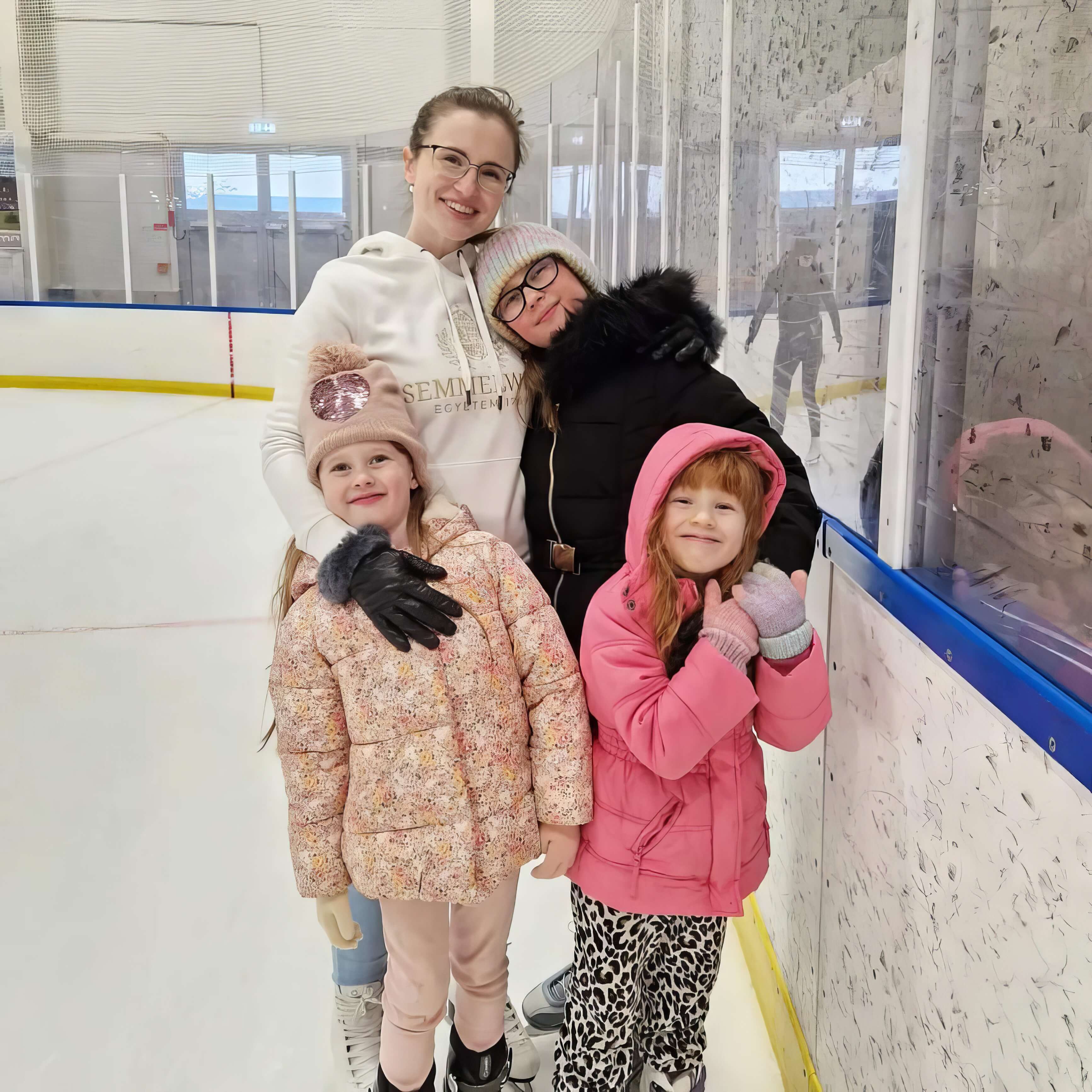 Budapest, 2023: Victoria with her daughters
Budapest, 2023: Victoria with her daughters
“We do have a lot of help because my mother-in-law lives with us,” says Victoria, “and my husband mostly works from home. After my son was born, we also moved my husband's elderly grandparents to live with us because there was nobody to look after them. I owe a lot to my wonderful supportive family!”
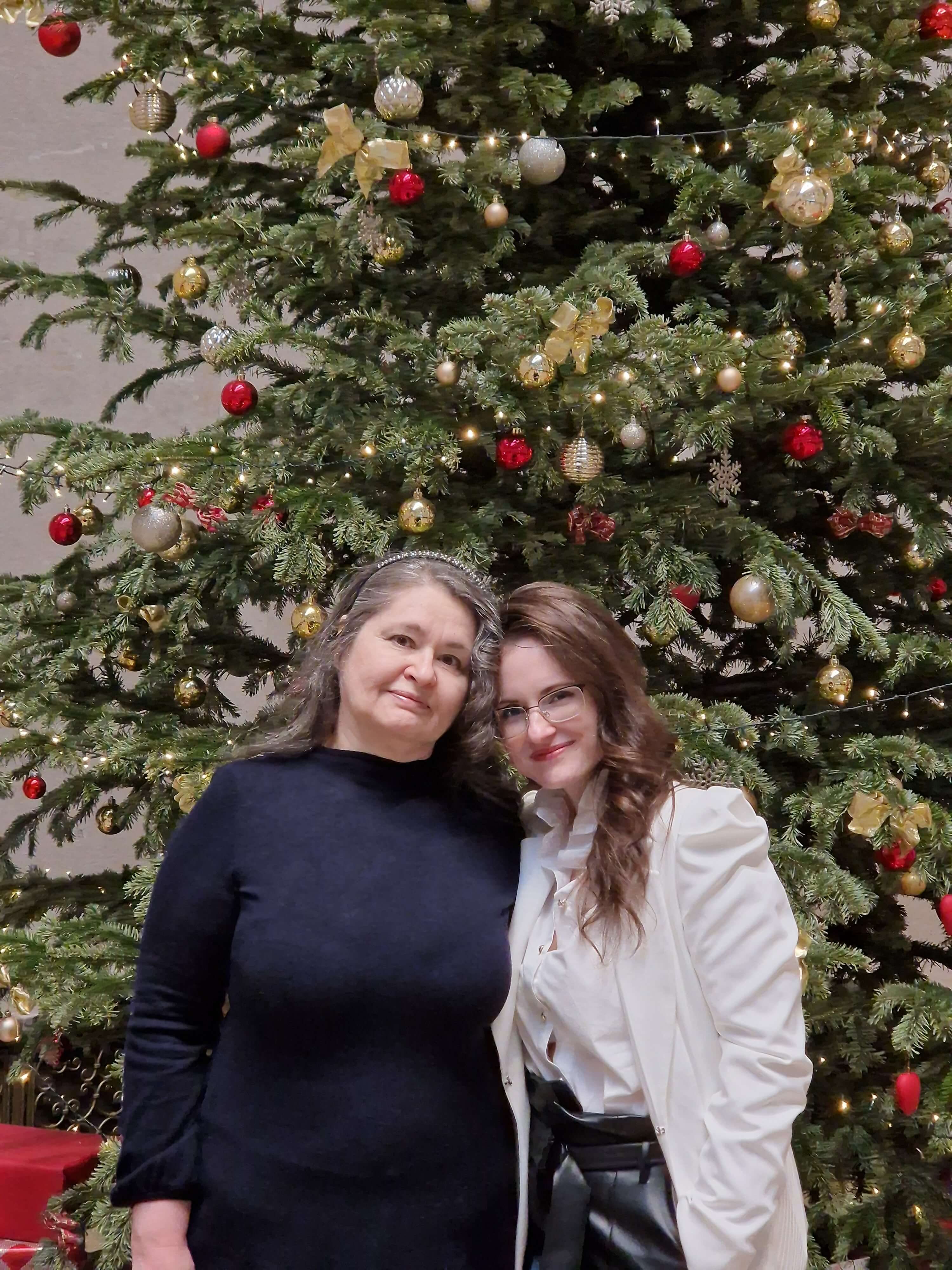 Victoria and her mother-in-law, Budapest
Victoria and her mother-in-law, Budapest
While studying for her Business degree, Victoria taught English and helped her husband with his IT enterprise. Yet she always felt a sense of regret at not having the chance to realise her earlier medical dreams.
“When I graduated in 2019, it coincided with Grandpa passing away – he was in hospital a lot over the years; he was very sick. And that was a sort of a turning point for me because having watched him suffer for so long I thought: I wish I could’ve done more for him. I always wanted to be there for people. Where am I heading in life? What happened to my dreams? I'm done with my degree now. So, what do I do?
“When Grandpa died, I sat down and re-evaluated my life. I’d toyed with the idea of medical school for years. Yet I had a family, how could I possibly do this? The hefty price tag was an additional deterrent. I knew that Semmelweis existed, and I would check it online sometimes, but then I would see the prices, and I would close the page. I always thought: maybe one day, when the kids have grown up. Grandpa’s death and my family’s endless support were a firm nudge in the direction of my dreams.”
Victoria’s husband and mother-in-law encouraged her to try for the Hungarian language course which would mean she could get government funding. She embarked on this not inconsiderable challenge just as Covid meant that schools were closing, and her children were having to study at home.
“We had to organise spaces for them to do the online classes and all of that. And meanwhile, I was trying to continue to do my work which was also online, and I was studying on the side which nobody knew about except my husband and mother-in-law.”
Halfway through her university preparation she learnt that she could apply for funding on the English-language course which was a previously impossible opportunity. Eighteen months into her preparation, Victoria took Semmelweis’s rigorous entrance exams and was accepted.
Her fellow students represent a wide range of countries and Victoria feels very much at home in this context.
“I've made so many friends from all over the world, it's really great that you get this sort of international hub in Budapest.” She also has praise for the course:
“I think it's very high quality. Besides anatomy, the first two years of education are very theoretical because first you must cover all the basic sciences. But then it gets pretty practical. From the third year we start going into clinics and we practise talking to patients, taking their medical histories, doing physical examinations.
“Not only did I get a chance to pursue my medical dreams here, but I also discovered my passion for research when I joined one of the university’s numerous labs as a student researcher in my first year of studies. Furthermore, given the complicated nature of my journey into medicine and the various challenges I faced as a woman and a mother, it became a priority for me to speak up and offer support to those who needed it.
“I have been active in various community events and on social media, promoting the roles of women in medicine and research for some time. This year, I had the honour of creating a new interview series within the Media Committee of the Students' Union. 'Semmelweis STEMtalk' is dedicated to highlighting the stories of incredible women researchers at our university and beyond.”
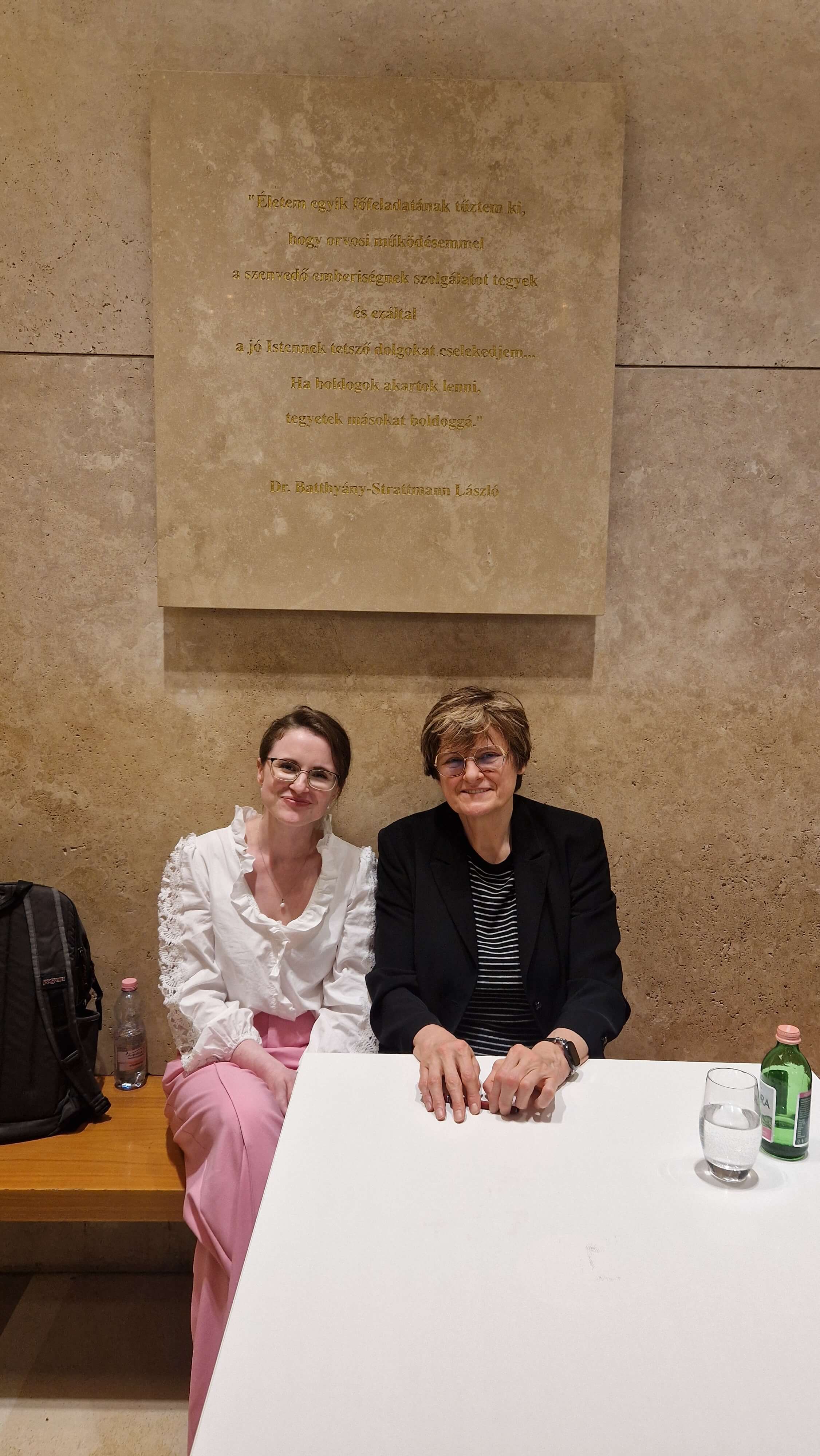
Nobel Laureate Dr.Katalin Karikó visits Semmelweis University
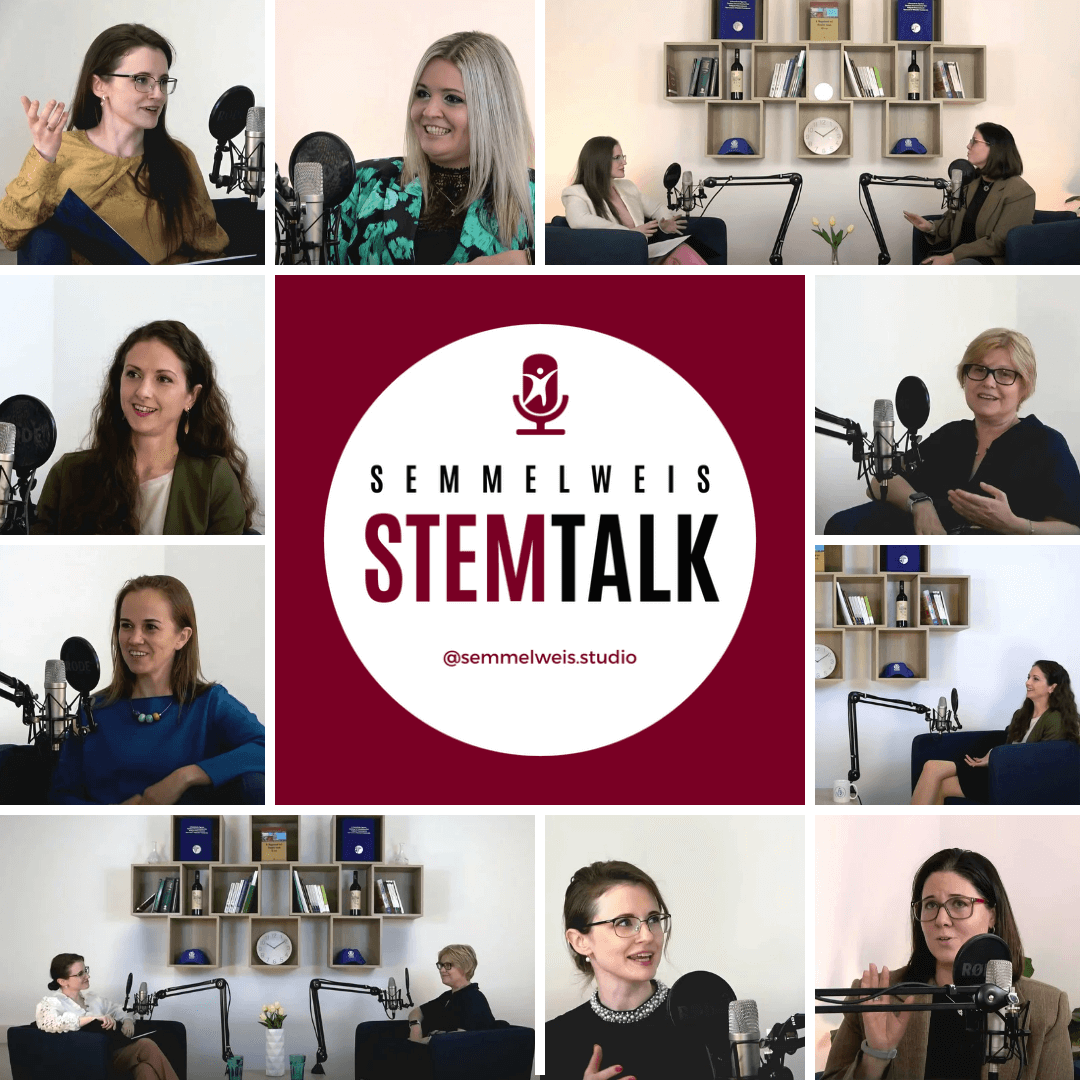 Victoria and guests of "Semmelweis STEMtalk" interview series, June 2024.
Victoria and guests of "Semmelweis STEMtalk" interview series, June 2024.
Victoria and her family are happily settled in Hungary. “It’s a family- friendly place. For me, as a family person, that's very important. I know people complain but we're quite happy with our children being in school here. I would say the quality of kindergarten and schools is still pretty high, and we've only had really good experiences.”
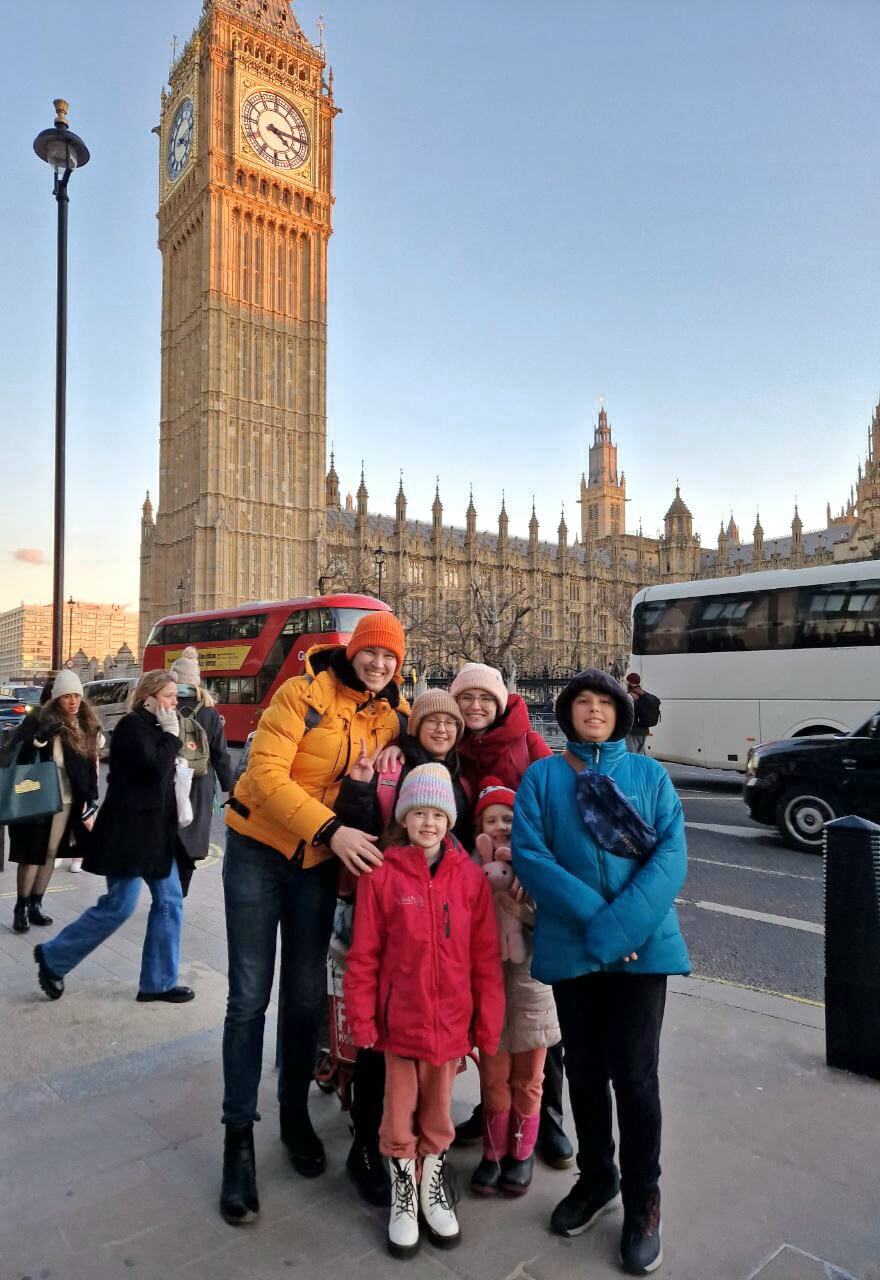
Victoria, husband Andrew and their four children, London, 2024
As for her future, it can come as no surprise that Victoria is looking forward to even more challenges.
“I really love internal medicine because I feel like it's the field where you are expected to know everything about everything, or at least something about everything, and you must synthesise all this information. I find that really interesting – you have to think a lot and it constantly keeps you on your toes. I am also very passionate about research. I hope to combine both my clinical and research interests in my future career.”
Links:
Tik Tok / You Tube / Instagram / X
Marion Merrick is author of Now You See It, Now You Don’t and House of Cards and the website Budapest Retro.
If you would like to be interviewed as a Surprising Expat, please write with a few details of what you do, to: Marion by clicking here.
























